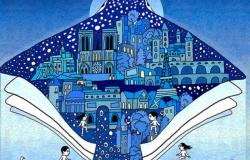At first glance, the beginning of sleepless night looks like a Proustian incipit. Midnight, in his apartment. Bernard-Henri Lévy returns to his room. He hopes to close his eyes as quickly as possible because he must arrive in good shape the next morning for a meeting which the reader understands will be decisive. To do this, he carried out all the preparations to the letter.
Lights off, phone in airplane mode, boring volume of Mallarmé on the bedside table, attention on night light. Only problem: unlike the narrator of ResearchBernard-Henri Lévy cannot sleep. It’s stronger than him. His body cannot “fall” from fatigue, a reflex whose mechanisms have become blocked within him. His mind refuses to let itself go into the world of dreams. Almost always, insomnia has been his Achilles heel.
It is the story, therefore, of an autobiography which breaks all the rules. Why did Bernard-Henri Lévy adopt, to narrate his existence made of commitments and ideas, the most carnal and prosaic angle possible – the very perspective of vulnerability: this meeting missing between the body and the soul what is the incapacity to extinguish one’s consciousness to capsize towards the inverted cosmos of dreams?
Throughout this closed door in chiaroscuro, it is indeed standing that the narrator faces the time that separates him from dawn. And the reader follows him, hour after hour, during this solitary crossing. He, the anti-homebody, moves around his apartment like a lion in a cage. Failing to count sheep, he lets his stream of consciousness draw, through images and waking dreams, the kaleidoscope of his self-portrait.
There are the memories, of course. Memories which, deviating from the canons of autobiographical writing, are not diluted in a lost past, but deploy a temporality in themselves, colorful with universes, where they all seem contemporary with each other. This childhood of which he had never spoken, or almost, before risking, here, to narrate fragments of it.
The rest after this ad
Any introspection carrying within itself an entire, if not exhaustive, library in which the very idea of literature is engaged
The multiple destinies that he already dreamed of at the time when he was still dreaming. A few passages where, who knows, perhaps some primitive scenes from his work come together. Then his enchanted meeting, in Milan, with A., the Orphean Eurydice of his text. A conversation, choppy and elliptical, with Philippe Sollers who advised him, shortly before his death, not to write his memoirs too early. The dead, therefore, who rise again one after the other. And then, the voice of all the echoes, his father, this secret hero who, revived from beyond the grave by the night, finds his voice again to speak to his son.
Every introspection carries within it an entire library, if not exhaustive, where the very idea of literature is engaged, there are the writers, friends or enemies, that Bernard-Henri Lévy exhumes here and there to deploy his own. Lautreamont, taking the beds for tombs and the sleeping bodies for pale corpses. Ronsard, a great insomniac before the eternal, whose dying body Bernard-Henri Lévy restores, in a hypotyposis larger than life. Conversely, the “Great Softheads” of German romanticism, Goethe and Novalis, singing of the voluptuous purity of the domain of Morpheus – let us allow ourselves, on this point, not to share his severity towards them… Sartre, living model of a hyperactive and self-destructive body, functioning as “a factory that never stops”.
-An allegory from the Maharal of Prague, telling that God invented sleep to mark forever the finiteness of our condition. And so many other authors, from Houellebecq to Camus, from Lamartine to Robbe-Grillet, from Guy Debord to Pessoa, that Bernard-Henri Lévy chose to discuss from the angle, not of cold quotation or academic restitution, but of the almost Hugolian convocation, without the turning tables, trying no less to restore in them the restless or dazzling incarnation.
Laugh at yourself, talk to everyone
There is style. A style which does not resemble any of his previous Books, and which nevertheless seems to reveal its source. Behind the “BHL” of his public image, the methodical “I” of his philosophical essays, the embedded narration of his reports or the cryptic “me” of the novelist emerges another voice. A nascent voice of work, whose lyricism, saturnine and solar, never fails to be incarnated at the very heart of this vibrant and singular mystery of self-writing. A voice closer in places to Philip Roth than to Malraux, to the Sartre of Words than to that of Situations, where the author deploys an art that he had always kept in reserve: self-deprecation.
A voice, in short, which is not afraid to start from the bottom to rise towards the truth of the soul which carries it
Because yes, “BHL” has humor. In this self-portrait painted from the point of view of the fragility that every man carries within him, he takes great joy in laughing at his own. He makes fun of his idiosyncrasies: why is he “against” umbrellas, watches, wheeled suitcases and pets? Why does he live with Little Siam, a cat whose life he ended up saving? How can he, who strives to maintain control over all things, owe a collection of blunders, each more inappropriate than the last, to sleeping pill errors? A voice, in short, which is not afraid to start from the bottom to rise towards the truth of the soul which carries it.
Because finally there is the main thing: meditation. What if sleep was the key to everything? Of everything, that is to say of a matrix refusal: the radical refusal to abandon oneself to the empire of the body. To say “yes” to nature and the way the world works. To close our eyes to the horror of the times. Isn’t this inability to sleep the key to a deeper struggle? Isn’t this, for example, what separates him from this extreme left which, despite its claim to remain awake (woke), falls asleep in the face of the dramas of the time? Isn’t this the eternal story of the conflict between reality and idealism? From the original ambition of Bernard-Henri Lévy: to invite writing to sing bigger than itself?
Hapaxes are rare in the literature. Books that venture down an improvised path. Which rise from the body to the soul, from the “heap of secrets” to metaphysics, and from the self-portrait to a poem that is universal. sleepless night is one, I wish a long life to the doors that open there.
sleepless nightby Bernard-Henri Lévy, Grasset, 192 pages, 18.50 euros.
* Essayist and columnist on CNews and Europe 1, Nathan Devers directed The Rules of the Gamemagazine founded by Bernard-Henri Lévy.






